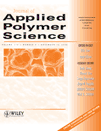Fabrication and characterization of a novel polypropylene/poly(vinyl alcohol)/aluminum hybrid layered assembly for high-performance fibrous insulation
Abstract
A novel hybrid layered assembly based on aluminum-coated poly(vinyl alcohol) (PVA) nanofibers supported on a polypropylene (PP) web was fabricated via electrospinning and physical vapor deposition. The PVA nanofibers and coated aluminum were characterized by field emission scanning electron microscopy and transmission electron microscopy. The results indicate that PVA nanofibers approximately 430 nm in diameter and an aluminum coating approximately 37 nm in thickness were successfully embedded on the supporting PP web. Fourier transform infrared spectra and the water vapor transmission rate were used to determine the IR spectral transmission and water vapor transmission through the materials with or without the nanofiber or metal coating, respectively. Compared to the uncoated PP web, the novel hybrid layered assembly showed a significant increase in thermal radiation extinction due to both the radiation reflection of the metal coating and the radiation absorption of the nanofibers without noticeable weight gain or water vapor permeable deterioration. This method represents a simple and practical approach for the production of a lightweight hybrid layered assembly that is highly beneficial in the efficient reduction of heat loss in low-density fibrous insulations without a noticeable deterioration in the water vapor permeability and that could be used for wide applications such as protective clothing, sleeping bags, building construction, and aircraft. © 2008 Wiley Periodicals, Inc. J Appl Polym Sci, 2008




